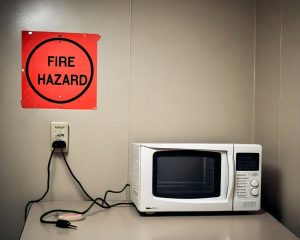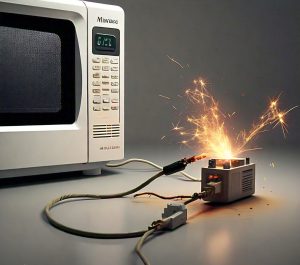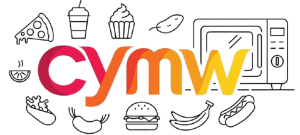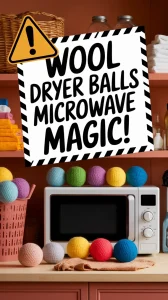An extension cord is a length of flexible electrical power cable with a plug on one end and one or more sockets on the other end.
The question at hand is whether you can plug a microwave into it or not.
This article will examine various aspects related to plugging a microwave into an extension cord, including safety concerns and potential impacts on the appliance’s performance. This includes discussing if microwaves can be safely hooked up to extension cords, how long they can operate in this setup without risk, any possible negative effects on the microwave’s functioning, and if not advisable then what are some alternatives to using an extension cord for your microwave. Furthermore, we’ll provide tips and precautions for those who might still opt for this setup as well as FAQs about microwaving with an extension cord and our final thoughts.

Jump To:
Can a Microwave Be Plugged into an Extension Cord?
Typically, plugging a microwave into an extension cord is not recommended. Microwaves require a lot of power and can easily overload an extension cord, leading to potential fire hazards. It’s always safer and more efficient to plug your microwave directly into the wall outlet. However, if it’s absolutely necessary, using a heavy-duty extension cord specifically rated for high-watt appliances could be considered but still carries risks.
Check out if a microwave can leak radiation.
Facts About Microwaves and Extension Cords
Here, we will discuss the important things to note about microwaves and extension cords.
- Power Consumption: Typical microwaves consume around 700-1500 watts of power depending on their sizes and types. It is crucial to check whether your extension cord can handle this load.
- Safety Concerns: Plugging a microwave into an extension cord may pose fire risks if the cord is not rated for such high wattage appliances.
- Cord Rating: The wire gauge and length of the extension cord influence its overall power handling capacity. A lower gauge number indicates a thicker wire that can deliver more current safely.
- Microwave Specifications: Manufacturer instructions often advise against using an extension cable with a microwave due to potential safety hazards or reduced microwave performance.
- Housing Codes: Some local housing codes may prohibit the use of electrical appliances like microwaves with extension cords due to risk factors associated with improper usage.
In conclusion, while it’s technically possible to plug a microwave into an extension cord, it’s generally advised against because of the numerous safety considerations involved.
Check out if you can have a microwave in a dorm.
Now, we will discuss some other things about microwaving activities in a general context.
What are the Alternatives to Microwaving with an Extension Cord?
The primary alternative methods for heating food instead of using a microwave include using conventional ovens, toaster ovens, or stovetops. These methods may require more time and energy but can provide results similar to that of a microwave. Other alternatives like slow cookers and electric grills can also be used depending on what type of food you want to prepare.
Tips When Microwaving with an Extension Cord
Here are a few tips when microwaving with an extention cord:
- Avoid placing non-microwave-safe materials such as metal in them since they can cause fire hazards.
- To ensure even cooking, stir or rotate your food halfway through its cooking time.
- Always use microwave-safe dishware designed specifically for this purpose.
- Foods with skins like potatoes should be pricked with a fork before microwaving to prevent bursting.
- To keep your appliance running efficiently, regularly clean spills inside by wiping them with mild detergent or water.
We have now discussed how one might go about employing other heating/cooking methods if unable or unwilling to use their microwave oven.
In our next section, we’ll dive further into frequently asked questions (FAQs).

Frequently Asked Questions (FAQs)
In this section, we will now look at the most commonly asked questions related to microwaving and heating.
Can a microwave be plugged into an extension cord?
No, a microwave should not be plugged into an extension cord. Microwaves require a significant amount of electricity and can overload an extension cord, leading to a potential fire hazard. It is recommended that microwave ovens are plugged directly into wall outlets which are properly grounded for optimal safety.
Is it safe to heat food in a microwave using plastic containers?
Not all plastics are safe for microwaving. Only use plastic containers labelled as ‘microwave-safe’, as these are designed to withstand the high temperatures generated during microwaving without releasing harmful chemicals. Avoid heated food in thin plastics like grocery bags or foam containers as they can melt easily or leech toxins into food.
Can you reheat coffee in a microwave?
Yes, you can safely reheat coffee in the microwave but note that it might change its taste because reheating may alter the chemical composition of coffee due to changes in temperature and could result possibly a bitter taste than a freshly brewed sip.
Do all ceramic dishes work well with microwaves?
No, not all ceramic dishes are suitable for microwave use. Ceramics marked ‘microwave-safe’ have been tested for safety when used under conditions of rapid heating while others may crack or explode under intense heat if they contain traces of metal particles.
This concludes our frequently asked questions section on microwaving and heating topics!
Final Word
A microwave is a handy appliance making day-to-day cooking convenient and fast-paced but understanding how it interacts with various items – from power sources to different types of dishes and food items, is quite important for safety and efficient use. Whether you’re reheating coffee or making sure your container is safe for microwave usage, it’s always better to follow manufacturer guidelines closely.



